I’m tired of making decisions.
And I don’t mean picking the right socks to match my shoes or selecting the best movie to watch tonight. I mean life-changing decisions that can define your destiny.
I’m tired of overthinking, overanalyzing and obsessing over such dilemmas. But I can’t just settle them with a coin toss either. And I bet you’re feeling tired just by thinking of the last time you had to make such a choice.
Remember when you decided to take up that mortgage? Or when you finally made up your mind about that career choice? That’s exactly the kind of life decisions I’m talking about.
They’re time-consuming and nerve-wrecking problems that we have to solve — one way or another. Get it right and you might open the door to a sparkling career or a happy marriage. Get it wrong and you’ll probably end up regretting it forever, dreaming of an elusive “happily ever after”.
But people have been making such decisions for thousands of years. There has to be an easier way to find the right choice. There must be some sort of method or system for making such decisions and getting them right. And there is.
Vagabonding through academia
During the past 4, years I’ve made 3 life-altering decisions. Each of them had the potential to lead me along completely different paths. And every time the decision was accompanied by fear, doubt, and tears.
After finishing med school I decided to emigrate. Although my hometown comprised lifelong friendships, many social connections, and several job opportunities, there was something missing. I couldn’t point my finger as it, but I knew I wanted more. So I decided to leave. This was the biggest decision of my life up to that point, one with huge implications and multiple potential outcomes. It also influenced everyone around me. And, sure enough, it came with a fair share of drama, tears, and even threats.
The second decision was to quit the research career I had dreamed of for the past 5 years. This was a shattering experience, making me doubt everything I thought I knew about myself and my ideal future. Back then I was working in a top-notch lab, next to a Nobel prize winner, with highly published papers and cutting edge techniques. But I still wasn’t happy with my life.
Finally, the third decision was to abandon a promising academic career in a major university hospital. At that point, I had already sacrificed hundreds of hours of my free time and quite a bit of my health for that position. It was one of great potential. I only had to hang in there for 3 more years, finish my residency, and the job offers were guaranteed to flow. Still, I decided against it. And leaving it behind felt like lifting a boulder off my shoulders.

4, 3, 2, … now what?
After switching 4 jobs, 3 cities and 2 countries in 4 years it was time to sit back and reflect. I took a month off and started looking for a solution.
The problem was simple: find a straightforward and bulletproof method of making decisions that lead to a happy life. Because this is my ultimate goal — to live a happy and fulfilling life. Not a wealthy, famous or successful life, but a happy one. If all the other things follow, all the better. And, sure enough, they did.
The bathtub revelation
According to the legend, Archimedes discovered his method for determining the volume of an irregular object while taking a bath. Similarly enough, while I was taking a bath with my wife one evening I looked her in the eyes and said: “I may have found the formula for a happy life”.
I’m not sure if shouting “Eureka” at the end would have made any difference, but the look she gave me was very skeptical. It was the you-with-your-whacky-ideas look. And formulating such a profound statement while being buck naked didn’t exactly help my cause. Still, I thought it was worth a closer look.
Playing life as a videogame
You’ve probably heard of Maslow’s pyramid, right? It’s that drawing you see in textbooks explaining something about psychologic needs and that sort of crap. But what’s the connection between such theoretical gibberish and the real world?

I will keep this short, so bare with me. Maslow said that people have 5 levels of basic needs:
- Survival (air, water, food, and shelter)
- Safety (personal and financial security, health and well-being)
- Love/belonging (friendship, intimacy, family)
- Esteem(respect, social status, self-confidence, competence and mastery)
- Self-actualization (fulfillment of ideals, passions, hobbies and dreams)
According to Maslow, if you want to live a happy life you need to work your way up the pyramid. Like playing a videogame, you first tick off all the items in level 2 and then move on to level 3. This sounds like a nice little theory, but how do you use it in real life?
Making happiness real
Using the method I found is easy: just print a copy of Maslow’s pyramid and look at it every time you have to make a big decision. Then ask yourself: will this choice move me up or down the pyramid? (Yes, you can be relegated back to level 1. There is no saved game.)
For example, let’s say you want to take up a loan to buy a Ferrari. Will this make your life happier? Is it worth it? Well, look at the pyramid. A fancy car will probably raise your self-confidence and/or social status (level 4). It may even fulfill a dream (level 5). This is great, you’ve reached the top of the pyramid! But if the monthly cost is too high it will affect your financial security (level 2) and all the other things won’t matter. You will still end up miserable and regretful.
The same method can tell you if you should take that better paying, more stressful job. Just look at the pyramid. Is your financial and personal future (level 2) secured? Will the extra money enable you to pursue some elusive dream or expensive hobby (level 5), or will it make you spend more time away from your family and friends (back to level 3)? The answer is right in front of you.
This is the basic principle of the method. But was I actually ready to base my life decisions on some crazy psychological theory? Well, after seeing everything else fail, I was.
Does it really work?
First I verified the theory using existing data: I started backtracking my past decisions. Doid the theory explain my choices and could it have predicted the outcomes? Surprisingly, the answer was yes.
Remember when I told you my hometown offered me almost everything, but I still wanted more? How I felt there must be more to life, but couldn’t really say what it was? Well, now I know: back home I had maxed out levels 1-3, but couldn’t find the entrance to level 4. Without knowing it I was striving for mastery and respect. That’s why I left.
Starting my PhD enabled me to complete level 4 and also part of level 5 (dreams, passions). Sadly, after a while, it started shaking the foundation of my pyramid by affecting the second level.
And because back then I hadn’t discovered this system of decision making, I made the same mistake a second time: picking a job with high social status and mastery (level 4 full all the way) for which I sacrificed my health and family (levels 2 and 3).

So now I could finally make sense of all the decisions of my past. It was quite the revelation (despite being naked in the bathroom) to realize how my biggest life decisions could be explained and understood by a simple system of values. All I had to do now was bet my near future to really find out if it works.
The pursuit of happiness
The next job I took is one with a high degree of security (level 2) and manageable workloads, which leave me with enough energy to spend on my family and friends (level 3). It’s also a position where I am really respected and appreciated (level 4 all the way). But, at the same time, I now have more free time to pursue other dreams and hobbies — like reading, writing this blog and riding my motorcycle (level 5 check).
I can’t say what the future holds or for how long I will be at the top of my personal pyramid. I just know I haven’t felt this serene, happy and fulfilled in my whole life. There will probably come a point where I will have to make another life-changing decision. But now I’m ready to face such decisions without fear – I have a system of optimizing for happiness.
There is no path to happiness; happiness is the path – Gautama Buddha
Originally published at optimizemy.life


